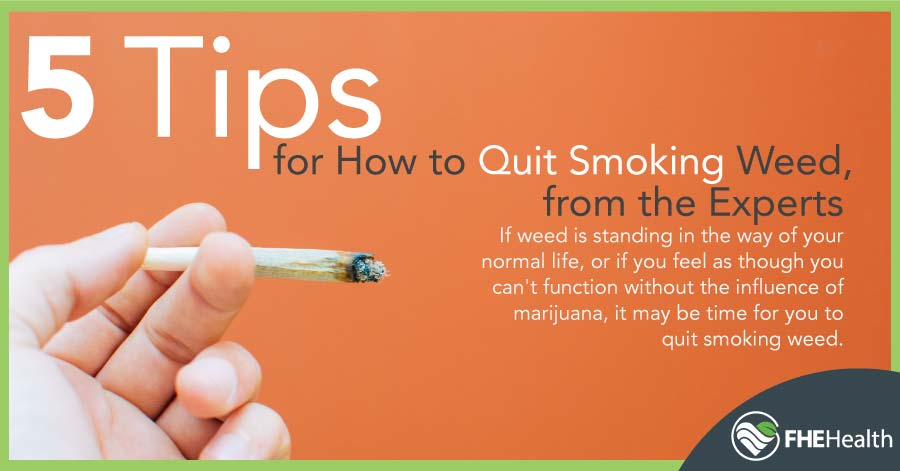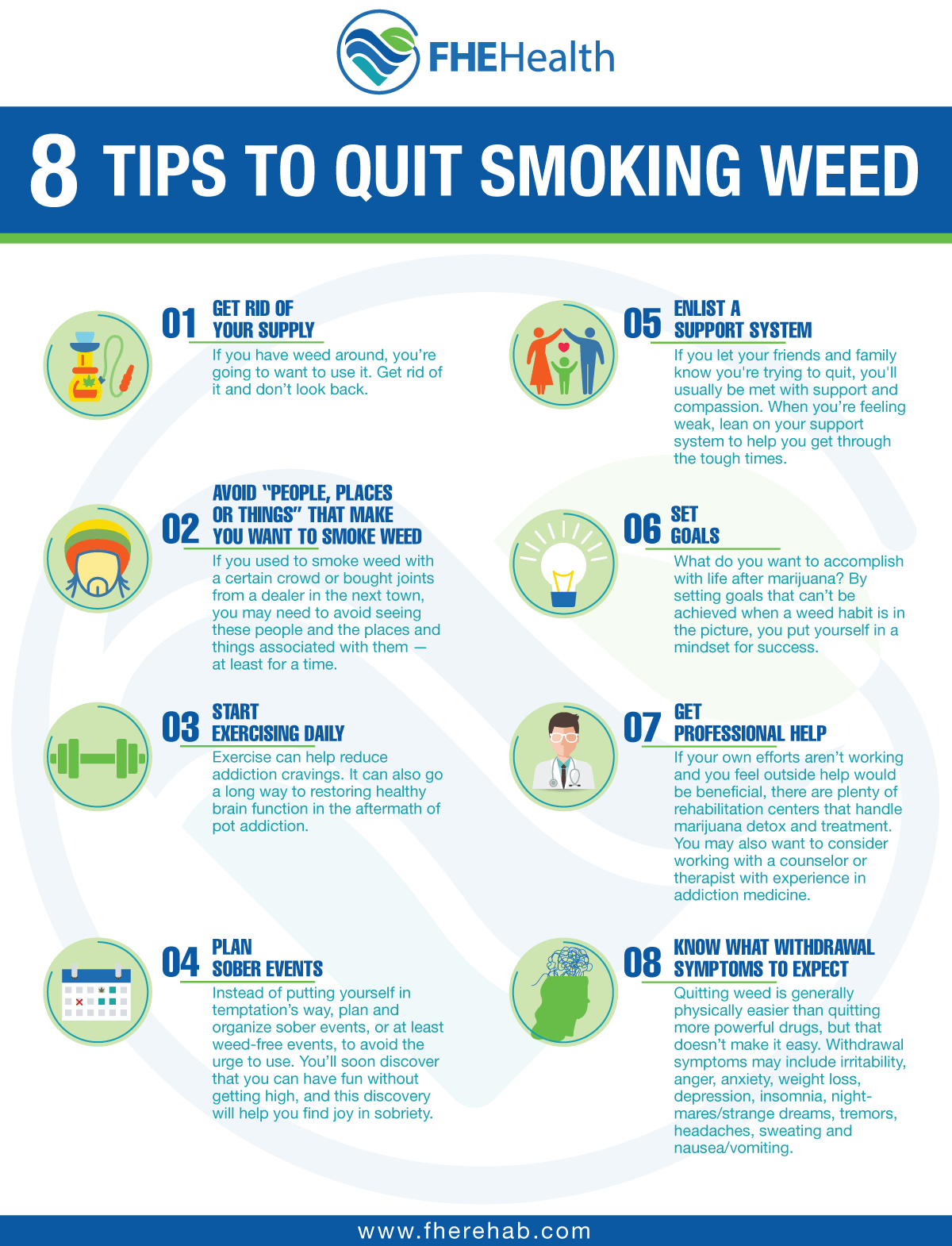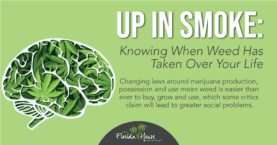
|
|
Updated on March 15, 2023
For millions of Americans — approximately one in seven — smoking weed is a common and enjoyable, recreational activity. Used primarily to relax, treat pain, party or simply relieve temporary stress, marijuana is largely seen as a less dangerous drug due to its usually milder effects and medicinal uses. However, just because marijuana lacks the dangers that drugs like heroin and meth may offer doesn’t mean a chronic weed habit is harmless. On the contrary, it can lead to negative physical and emotional consequences that impair your quality of life. If weed is having this impact in your life or you feel as though you can’t function without the influence of marijuana, it may be time for you to quit smoking weed.
Tips to Quit
So, you’re ready to quit. Now what?
While detoxing from marijuana is relatively easy compared to detoxing from some other drugs, quitting any addiction isn’t easy. Some people are afraid of the effects on their day-to-day life, while others are worried about the physical side effects of withdrawal. Such concerns shouldn’t stop you from taking the leap. All things considered, withdrawal symptoms from marijuana are usually pretty mild and may include headaches, mood swings, irritability, change in dreams and trouble focusing. Furthermore, there are no serious physical risks when quitting cold turkey like there are for alcohol or benzodiazepines.
In many ways, successfully detoxing from marijuana is more of a mental hurdle than a physical one: It’s much more tied up with your daily habits than the physical challenges of detox; and the right mindset can make all the difference. The following tips can help you do what’s right for your health and your life.
1. Get Rid of Your Supply
If you have weed around, you’re going to want to use it. As soon as you’ve decided to quit, don’t keep your drugs around; instead, get rid of them and don’t look back.
2. Avoid “People, Places or Things” That Make You Want to Smoke Weed.
People in early recovery from drugs or alcohol are often counseled to avoid people, places or things that trigger cravings to drink or use drugs. This principle can be just as helpful for those hoping to kick a weed habit. If you regularly used to smoke weed with a certain crowd, or bought joints from a dealer in the next town over, you may need to avoid seeing these people and the places and things associated with them— at least for a time.
3. Start Exercising Daily.
Research has shown that exercise can help to reduce addiction cravings. It also can go a long way to restoring healthy brain function in the aftermath of pot addiction (which a growing body of research has associated with cognitive and structural impairment). Exercise is also a great buffer against stress, so it can serve as a healthy, alternative coping device for those who may have smoked weed because of stress.
4. Plan Sober Events
If you spend your nights at parties with other pot-smoking friends, breaking your routine will be particularly difficult. Instead of putting yourself in temptation’s way, plan and organize sober events, or at least weed-free events, to avoid the urge to use. You’ll soon begin to discover that you can have fun without getting high, and this discovery will help you find joy in sobriety.
5. Enlist a Support System
In most cases, if you let your friends and family know that you feel you have a problem and are trying to quit, you will be met with support and compassion. You’ll be more compelled to stick to a commitment that you’ve voiced and won’t want to let them down. When you’re feeling weak, lean on your support system to help you get through the tough times.
6. Set Goals
What do you want to accomplish with life after marijuana? By setting goals that can’t be achieved when a weed habit is in the picture, you put yourself in a mindset for success.
7. Get Professional Help
If your own efforts aren’t working and you feel that outside help would be beneficial, there are plenty of rehabilitation centers that handle marijuana detox and treatment. You may also want to consider working with a counselor or therapist with experience in addiction medicine.
8. Know What Withdrawal Symptoms to Expect
It’s true that quitting weed is generally a physically easier detox experience than quitting other more powerful drugs like opioids, but that doesn’t make it necessarily easy. A person who has abused marijuana for a long period of time may find marijuana withdrawal symptoms and the initial recovery period challenging. A person may feel strange for days, weeks, and, possibly, even months as their body and mind transition from drug dependent to drug free.
After quitting your marijuana habit, there are a few things you might expect that may leave you feeling strange or unpleasant. Don’t let them derail your recovery journey. Some people relapse rather than allowing the recovery process to take its natural course. Remember that these symptoms will subside and, ultimately, disappear in time.
Some common marijuana withdrawal symptoms include:
- Irritability: Some people may feel on edge and easily irritated.
- Anger: Irritability can quickly progress to anger and feelings of aggression.
- Anxiety: Marijuana withdrawal can trigger feelings of nervousness, restlessness, and anxiety.
- Weight loss: Some people feel a loss of appetite that can persist for weeks.
- Depression: Withdrawal can take a toll on mental health, leaving some people with symptoms of depression.
- Insomnia: Withdrawal can cause sleep disturbances. Many people find it hard to relax and get sleep.
- Nightmares/strange dreams: Some people might experience disturbing dreams or even nightmares.
- Tremors: Some people may experience trembling hands.
- Headaches: Headaches are a common symptom of marijuana withdrawal.
- Sweating: Profuse sweating may accompany withdrawal.
- Nausea/vomiting: Gastrointestinal complaints aren’t extremely common during marijuana withdrawal but can occur.
Cannabis Withdrawal Syndrome
Experiencing three or more of these symptoms is dubbed “cannabis withdrawal syndrome.” The symptoms may be mild or severe, but they do dissipate over time. Some people go to rehab to reduce their symptoms, but if you are detoxing from weed and recovering at home, you, too, may be able to reduce these symptoms with over-the-counter headache medicine and rest.
Medical experts advise people to be gentle with themselves during this initial recovery period. Stay hydrated and try to minimize exposure to stress. Your brain and body are getting used to a new reality. Although this is just part of the recovery process, it can be an uncomfortable few weeks. If your symptoms should escalate, it’s important to let your doctor or nurse practitioner know. There are many treatments that can help reduce withdrawal symptoms so you can heal in more comfort.
Try to remind yourself that withdrawal is part of the healing process and these symptoms will go away. When they do, you’ll feel better and, what’s more, no longer dependent on marijuana.
Signs of a Problem
Weed is often believed to be fairly unproblematic, in large part due to its less addictive nature, its acceptance by many in the medical community, and its growing legality. That said, frequent weed use can turn into a harmful addiction and may require professional help to resolve. If you display any of these signs related to your use of marijuana, now may be the time to learn how to reduce your pot intake— or, even better, quit weed altogether:
- Anxiety and stress without weed: Marijuana can be a good way to relieve stress, particularly for those with anxiety disorders, but too much can take you over the top. If you can’t function or feel normal without weed, you may have a problem.
- Hiding the extent of your use: If you feel the need to hide your activity from those who generally approve of pot, you may be smoking too much.
- Stealing or lying to secure weed: If you are so desperate for marijuana that you have resorted to lying or stealing to feed your habit, your smoking may have gone too far.
- Disinterest in life without weed: If marijuana is standing in your way of living a full and enriching life when you’re not high, your habits are indicative of a problem.
- Using weed at inappropriate times: If you find yourself smoking during a work shift, at your children’s activities, or in a worship service, for example, reconsider your drug use.
It may be possible to correct your habits after initial signs of problematic behavior, but for regular, recreational marijuana users, any of these factors may indicate a sign to quit.
The Best Way to Stop Smoking
For those with a long-term smoking habit, the idea of stopping can be fairly troubling. When marijuana is at the center of your life—your hobbies, your friends, your nighttime activities—imagining a life without it isn’t easy.
But, whether you realize it or not, your use of drugs that are illegal on a federal level is going to hold you back in one way or another. Maybe that means failing a background check for your dream job or wasting time that could otherwise be invested in creative endeavors. Perhaps your appetite for weed is standing in the way of important personal goals such as weight loss or fitness, or your grades are sliding because you’ve been smoking instead of studying.
You may not have even realized the extent of your challenges so far, but when you really stop to think about it, you’ll likely be able to identify at least one area of life that could be improved by sobriety. From achieving the GPA you need to get into medical school, to testing clean for drugs at your next job interview, quitting weed can help you break away from a toxic lifestyle and open doors to new opportunities. The sooner you realize this, the more motivated you will be to quit.
How to Get Rid of Marijuana
Getting rid of your marijuana is an integral part of quitting, but actually doing so may be more difficult than it sounds. Be aware that some states have distinct policies surrounding disposal, so follow all area rulings as closely as possible. In some locations, amnesty programs allow you to turn drugs in to be destroyed with no personal consequences, while states with legal recreational marijuana may employ specific disposal policies. If there are no clear laws in your area, flushing is sometimes suggested because marijuana is a natural substance that will disintegrate without clogging pipes. Do not sell your drugs to friends; depending on the quantity you possess, this could quickly become a felony.
Your Next Steps Toward Quitting
Any kind of drug addiction can be a problem, and that includes marijuana. Marijuana dependence is a real condition that often coincides with mental health conditions such as anxiety and depression. Many people struggle with this dependency and need assistance to end their use. Inpatient treatment is an option for this type of use and, depending on your circumstances, may be covered by insurance.









